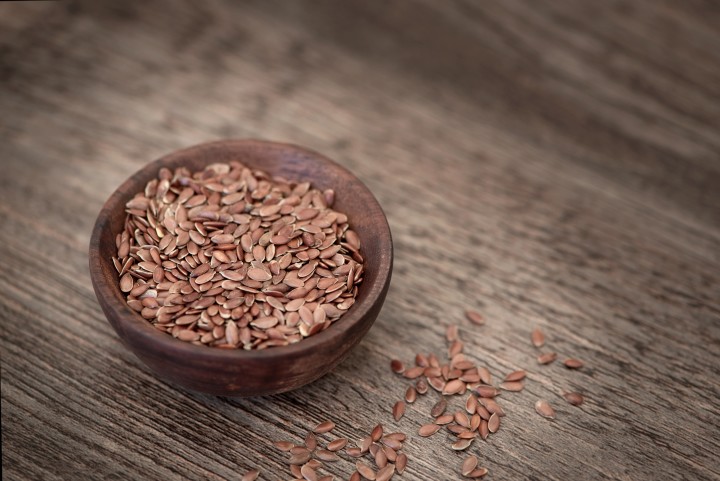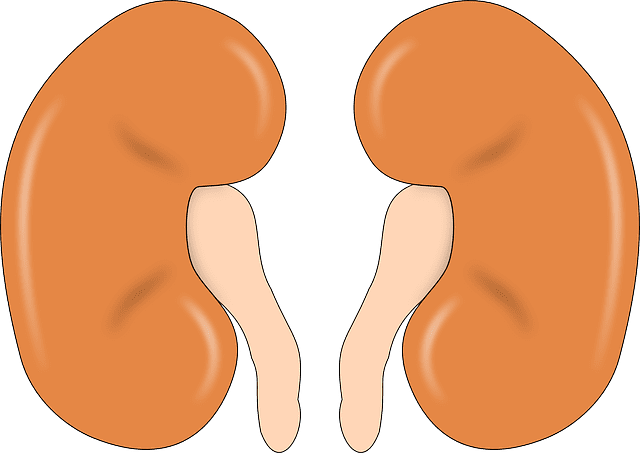An incredible home remedy for chronic kidney disease
Flaxseed tea is an incredible home remedy for chronic kidney disease (CKD). [1] It contains nutrients and antioxidants to help improve kidney health and protect against damage. For those unfamiliar with flaxseed tea, it is made by boiling water and adding flaxseeds to it. The tea has a nutty flavor and can be enjoyed hot or cold.

Numerous studies have shown that flaxseed tea can help improve kidney function in chronic kidney disease patients. In one study, patients with CKD who consumed flaxseed tea daily for three months significantly improved their creatinine levels, a marker of kidney function. Flaxseed tea can be a great way to get the nutrients and antioxidants needed to make your kidney healthy. They also help decrease the disease progression. [2]
Additionally, flaxseed tea’s anti-inflammatory properties can help reduce the inflammation associated with kidney disease.
What is chronic kidney disease?
Chronic kidney disease (CKD) or chronic kidney failure is a progressive loss of kidney function. It occurs in about 8-16% of individuals worldwide. [3] When CKD progresses to end-stage renal disease (ESRD), the kidneys no longer adequately filter waste and remove fluid (absolute loss of kidney function). The only way to prevent CKD progression is by getting treatment earlier.
There are two main types of CKD:
1. Primary CKD is when the kidneys are damaged for a specific reason, such as high blood pressure or diabetes.
2. Secondary CKD is when the kidneys are damaged due to a previous injury or infection.
What causes chronic kidney disease?
Various forms of chronic diseases affect kidney function causing kidney damage. This damage lasts for months to years and results in CKD.
There are many causes of CKD, including:
- Glomerulonephritis (a type of kidney inflammation),
- Kidney stones
- Vesicoureteral reflux (in this condition, urine moves back toward the kidneys) [4]
- Recurrent kidney infections (pyelonephritis)
- Prolonged obstruction of the urinary tract
- Polycystic kidney disease (a genetic disorder) [5]
- Interstitial nephritis
- Membranous nephropathy (auto-immune reaction against waste filtering membranes)
- Nephrotic syndrome
Different risk factors for CKD are:
- Diabetes (type 1 & 2)
- Heart diseases
- Black ethnicity [3]
- Previous family history of CKD
- Smoking
- High blood pressure
- Obesity
- Urinary tract infections
Treatment for CKD often includes lifestyle changes, such as quitting smoking and losing weight, as well as medication.
How the patient with CKD presents?
Chronic kidney disease (CKD) is a progressive loss of kidney function. Symptoms of CKD depend on the severity of the condition. In the early stages, patients may experience no symptoms at all. However, patients may experience fatigue, nausea, and fluid retention as the disease progresses. Patients may also experience kidney failure in the late stages, leading to death. [6] General symptoms of CKD include
- Frequent urge to urinate
- Difficulty urinating
- Low energy level
- Appetite loss
- Weight loss
- Swollen hands, fingers, feet, and ankles
- Feeling shortness of breath
- Blood in urine
- Itching and dryness on the skin
- Nausea
- Vomiting
- Tingling in the lower limb
- Swollen eyes
When your kidneys are out of order, it also affects the rest of your body. Therefore, CKD can lead to severe complications:
- Anemia (yellowing of conjunctiva of the eye)
- Weak bones
- Gout (caused by raised uric acid in serum) [7]
- High blood pressure
- Cardiovascular pathologies [8]
- Metabolic acidosis
- Hyperphosphatemia (increased phosphate levels in the blood)
- Hyperkalemia (increased potassium levels in the blood that affects cardiac activity)
- Decreased immunity
- Erectile dysfunction
How to diagnose CKD?
First, your doctor will take a thorough medical history, do a thorough physical exam, enquire about any medications you’re taking, ask about any symptoms you’ve been experiencing, and find out whether anybody in your immediate family has kidney disease. Your doctor will ask for certain lab tests, including a urinalysis, blood tests, and a blood pressure check. [9]
The blood test will be analyzed for these factors:
Glomerular filtration rate (GFR): How quickly your kidneys filter blood and how many milliliters of blood is being filtered by your kidneys per minute indicates their efficiency. Kidney disease progression is measured against GFR.
The efficiency with which your kidneys eliminate creatinine from your serum. Creatinine is generally eliminated by urination, a byproduct of muscle metabolism. If your creatinine levels are high, your kidneys aren’t filtering waste effectively.
A urine protein test may detect the presence of albumin and blood in the urine. Damage to the kidneys is indicated if this occurs. If your kidneys are healthy, there will be no albumin and proteins in your urine.
Imaging tests such as ultrasonography, magnetic resonance imaging (MRI), and computed tomography (CT) scans may also be performed to check the size and shape of your kidneys.
Your doctor may conduct a biopsy to rule out any possible diagnoses or assess the extent of any damage. You will be given a local anesthetic before taking a small sample of your kidney tissue for analysis.
What are the various treatment options?
Maintaining a healthy lifestyle helps prevent CKD. While there is no cure for CKD, treatments available can help slow its progression and improve quality of life.
Medical treatment
There are many different medical treatments for chronic kidney disease (CKD), and the best approach depends on the individual patient. In general, treatment focuses on slowing the progression of CKD and managing its symptoms. [10]. Common medications used to treat CKD include:
- Angiotensin-converting enzyme (ACE) inhibitors: Lisinopril, Captopril
- Angiotensin receptor blockers (ARBs): Valsartan, Eprosartan
- Calcium channel blockers:
- Erythropoietin-stimulating agents (to increase red blood cells if the patient is anemic)
- Phosphate binders (slow down CKD progression)
These drugs are being used to treat high blood pressure and decrease CKD progression. [11] If you have CKD, it’s important to work closely with your doctor to create a treatment plan that’s right for you.
Dialysis
Dialysis has two types, hemodialysis, and peritoneal dialysis.
- Hemodialysis removes waste and water from your blood by circulating it through an external filter.
- Peritoneal dialysis removes waste and excess water from your blood by circulating it through the lining of your abdomen (peritoneum).
The decision to start dialysis is a complex one that you and your healthcare team should make. There are many factors to consider, including your overall health, lifestyle, treatment goals, and preferences.
Kidney transplant
Chronic kidney disease (CKD) is a progressive disease that can eventually lead to kidney failure.
A kidney transplant is a process in which a healthy donor kidney is transplanted into a person with CKD. The transplanted kidney takes over the diseased kidneys’ functions and helps filter waste products from the blood. Kidney transplants can dramatically enhance the quality of life for people with CKD and may even extend their life expectancy. [12]
If you or someone you know has CKD, talk to your doctor about whether a kidney transplant may be right for you.
How can natural remedies be useful against CKD?
Certain chronic kidney disease patients prefer home remedies and alternative medicines. Many different natural remedies can be useful in the fight against chronic kidney disease (CKD).
One of the most effective and easily accessible natural remedies is flaxseed tea. Studies have shown that flaxseed tea can significantly increase levels of important antioxidants in the body, which can help to protect the kidneys from further damage. Due to the severity of kidney infection, self-care is not an absolute treatment choice.
Take the antibiotics your doctor prescribes and supplement them with any over-the-counter pain relievers you find helpful. Home remedies may also protect against UTIs and boost kidney health.
How does Flax seed Tea help with chronic kidney disease?

Flaxseed tea has many benefits, especially for those suffering from chronic kidney disease.
i) It is high in omega-3 fatty acids, lignans (PHytoestrogens), and fiber
Flaxseed is a rich source of omega-3 fatty acids, lignans (PHytoestrogens), and fiber. These nutrients have been shown to protect against various chronic diseases, including heart disease, cancer, and kidney disease. Flaxseed tea has been shown to improve kidney function in several studies. In one study, flaxseed tea decreased creatinine and blood urea nitrogen (BUN) levels in patients with chronic renal failure. [13] , Creatinine is a waste product in kidneys, and BUN is a measure of kidney function.
ii) It has an anti-inflammatory effect
In another study, flaxseed tea improved the glomerular filtration rate (GFR) in patients with chronic renal insufficiency. The improved GFR was attributed to the anti-inflammatory and antioxidant effects of flaxseed. [14]
iii) Decreases the risk of albuminuria
Flaxseed tea also appears beneficial for diabetic nephropathy, a type of kidney damage in people with diabetes. In one study, flaxseed tea decreased the levels of albuminuria (a measure of kidney damage) in patients with diabetic nephropathy. The evidence suggests that flaxseed tea may benefit people with chronic kidney disease.
Precaution: Flaxseed tea is generally safe for most people. Pregnant and nursing women should avoid flaxseed tea due to the possible estrogenic effects of flaxseed. [15]

How can you make flaxseed tea at home?
To make flaxseed tea at home, you’ll need the following:
- Whole flaxseeds
- A pot or teapot
- Water
- Honey (optional)
- Slice of lemon (optional)
Directions:
1. Boil the water and let it cool for about 2 minutes. Don’t boil the water too much, as this can damage the delicate nutrients in the flaxseeds.
2. Add 1-2 tablespoons of flaxseeds to the pot or teapot.
3. Pour the 2 cups of cooled boiling water over the flaxseeds, and then let the mixture steep for about 15 minutes.
4. After 15 minutes, strain the tea using a strainer or cheesecloth into a cup or mug.
5. Add honey or squeeze lemon to taste (optional).
Other Recipes on this blog with the use of flaxseeds are:
What are other health benefits of flax seed tea?
Flaxseed tea has several other health benefits in addition to its role in treating chronic kidney diseases. These include:
1. Reducing the risk of heart disease: Flaxseed has an abundance of omega-3 fatty acids, which helps lower blood pressure and protect against heart disease. It also helps lower cholesterol levels and improves heart health. [16]
2. Improving digestion: Flaxseed’s high fiber content can help improve digestive health by promoting regularity and preventing constipation. [17]
3. Supporting weight loss: The combination of fiber and protein in flaxseed can help you feel fuller for longer, making it an excellent addition to a weight-loss diet.
4. Boosting skin health: Flaxseed’s anti-inflammatory properties may help reduce the swelling associated with acne and other skin conditions.
5. Protection against cancer: It contains lignan, which has an anti-cancer effect. Flaxseed also contains antioxidants, protecting the body against cellular damage. Studies have shown that flaxseeds protect against skin, breast, colorectal, blood, and lung cancer. [18]
6. Help reduces blood pressure: Studies have shown that flaxseed reduces blood pressure and is beneficial for cardiac health.
In conclusion, flaxseed tea is a healthy drink with many potential health benefits. Anyone can enjoy this tea, but it may be especially beneficial for those with chronic kidney disease.
The Bottom Line
Flaxseed tea is a herbal tea made from the seeds of the flax plant. It has been used for centuries as a natural remedy for various ailments, including kidney disease. Flaxseed tea is rich in antioxidants and anti-inflammatory compounds. These nutrients can help protect your kidneys from further damage and may even help reduce the symptoms of CKD.
While there is no cure for CKD, flaxseed tea may help slow its progression and improve your quality of life. If you have CKD, talk to your doctor about whether flaxseed tea is right for you.
I hope you enjoyed this information on Chronic Kidney Disease. If you did you can choose to follow this and other resource material on my other Social Media Platform, TIKTOK, SOMETHING BETTER TODAY, PINTEREST, and YOUTUBE.
References
1. Ingram, A. J., Parbtani, A., Clark, W. F., Spanner, E., Huff, M. W., Philbrick, D. J., & Holub, B. J. (1995). Effects of flaxseed and flax oil diets in a rat-5/6 renal ablation model. American journal of kidney diseases: the official journal of the National Kidney Foundation, 25(2), 320–329. https://doi.org/10.1016/0272-6386(95)90015-2
2. Al Za’abi, M., Ali, H., & Ali, B. H. (2021). Effect of flaxseed on systemic inflammation and oxidative stress in diabetic rats with or without chronic kidney disease. PloS one, 16(10), e0258800. https://doi.org/10.1371/journal.pone.0258800
3. Jha, V., Garcia-Garcia, G., Iseki, K., Li, Z., Naicker, S., Plattner, B., Saran, R., Wang, A. Y., & Yang, C. W. (2013). Chronic kidney disease: global dimension and perspectives. Lancet (London, England), 382(9888), 260–272. https://doi.org/10.1016/S0140-6736(13)60687-X
4. Hewitt, I., & Montini, G. (2021). Vesicoureteral reflux is it important to find?. Pediatric nephrology (Berlin, Germany), 36(4), 1011–1017. https://doi.org/10.1007/s00467-020-04573-9
5. Miskulin, D. C., Abebe, K. Z., Chapman, A. B., Perrone, R. D., Steinman, T. I., Torres, V. E., Bae, K. T., Braun, W., Winklhofer, F. T., Hogan, M. C., Rahbari-Oskoui, F., Moore, C. G., Flessner, M. F., Schrier, R. W., & HALT-PKD Study (2014). Health-related quality of life in patients with autosomal dominant polycystic kidney disease and CKD stages 1-4: a cross-sectional study. American journal of kidney diseases: the official journal of the National Kidney Foundation, 63(2), 214–226. https://doi.org/10.1053/j.ajkd.2013.08.017
6. Romagnani, P., Remuzzi, G., Glassock, R., Levin, A., Jager, K. J., Tonelli, M., Massy, Z., Wanner, C., & Anders, H. J. (2017). Chronic kidney disease. Nature reviews. Disease primers, 3, 17088. https://doi.org/10.1038/nrdp.2017.88
7. Johnson, R. J., Nakagawa, T., Jalal, D., Sánchez-Lozada, L. G., Kang, D. H., & Ritz, E. (2013). Uric acid and chronic kidney disease: which is chasing which?. Nephrology, dialysis, transplantation: official publication of the European Dialysis and Transplant Association – European Renal Association, 28(9), 2221–2228. https://doi.org/10.1093/ndt/gft029
8. Matsushita, K., Coresh, J., Sang, Y., Chalmers, J., Fox, C., Guallar, E., Jafar, T., Jassal, S. K., Landman, G. W., Muntner, P., Roderick, P., Sairenchi, T., Schöttker, B., Shankar, A., Shlipak, M., Tonelli, M., Townend, J., van Zuilen, A., Yamagishi, K., Yamashita, K., … CKD Prognosis Consortium (2015). Estimated glomerular filtration rate and albuminuria for prediction of cardiovascular outcomes: a collaborative meta-analysis of individual participant data. The Lancet. Diabetes & endocrinology, 3(7), 514–525. https://doi.org/10.1016/S2213-8587(15)00040-6
9.Vassalotti, J. A., Stevens, L. A., & Levey, A. S. (2007). Testing for chronic kidney disease: a position statement from the National Kidney Foundation. American journal of kidney diseases : the official journal of the National Kidney Foundation, 50(2), 169–180. https://doi.org/10.1053/j.ajkd.2007.06.013
10. Markell M. S. (2005). Potential benefits of complementary medicine modalities in patients with chronic kidney disease. Advances in chronic kidney disease, 12(3), 292–299. https://doi.org/10.1016/j.ackd.2005.03.004
11. Turner, J. M., Bauer, C., Abramowitz, M. K., Melamed, M. L., & Hostetter, T. H. (2012). Treatment of chronic kidney disease. Kidney international, 81(4), 351–362. https://doi.org/10.1038/ki.2011.380
12. Fiebiger, W., Mitterbauer, C., & Oberbauer, R. (2004). Health-related quality of life outcomes after kidney transplantation. Health and quality of life outcomes, 2, 2. https://doi.org/10.1186/1477-7525-2-2
13. Al-Bishri W. M. (2013). Favorable effects of flaxseed supplemented diet on liver and kidney functions in hypertensive Wistar rats. Journal of oleo science, 62(9), 709–715. https://doi.org/10.5650/jos.62.709
14. Al Za’abi M, Ali H, Ali BH (2021) Effect of flaxseed on systemic inflammation and oxidative stress in diabetic rats with or without chronic kidney disease. PLOS ONE 16(10): e0258800. https://doi.org/10.1371/journal.pone.0258800
15. KHAN G, PENTTINEN P, CABANES A, FOXWORTH A, CHEZEK A, MASTROPOLE K, et al. Maternal flaxseed diet during pregnancy or lactation increases female rat offspring’s susceptibility to carcinogen-induced mammary tumorigenesis. Reproductive Toxicology. 2007;23(3):397–406.
16. Goyal, A., Sharma, V., Upadhyay, N. et al. Flax and flaxseed oil: an ancient medicine & modern functional food. J Food Sci Technol 51, 1633–1653 (2014). https://doi.org/10.1007/s13197-013-1247-9
17. Parikh M, Maddaford TG, Austria JA, Aliani M, Netticadan T, Pierce GN. Dietary flaxseed as a strategy for improving human health. Nutrients. 2019;11(5):1171.
18. DeLuca, J., Garcia-Villatoro, E. L., & Allred, C. D. (2018). Flaxseed Bioactive Compounds and Colorectal Cancer Prevention. Current oncology reports, 20(8), 59. https://doi.org/10.1007/s11912-018-0704-z

Leave a Reply